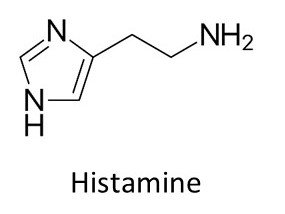Lactobacillus casei, Histamine Producer or Probiotic?
 |
Lactobacillus casei (L. casei) is a probiotic bacterium that has undergone classification changes over the years. The probiotic listed on your supplement may not actually be L. casei. |
For most people, this won’t matter, but for those who have read unfavorable things about L. casei, such as histamine production, please continue reading. A lot of websites publishing information about probiotics may not delve into the studies to know the differences, so they unknowingly are passing on incorrect information to you. My goal for this website is to base the information on science, so I read through the tedious details as best I can.
If you haven’t read the page on Lactobacillus yet, I encourage you to do that so you can understand the subtleties of the Lactobacillus group. In fact, this species is now correctly referred to as Lacticaseibacillus casei, but since probiotic supplements still list it as Lactobacillus, that is what I will do on this page.
Lactobacillus casei
are Gram-positive, non-spore forming, lactic-acid producing, rod-shaped
bacteria which do not have flagella to move about. They are commonly
found in the gastrointestinal (GI) tract, fermented vegetables, milk,
meat, silage and sewage. They are often used as promoters of maturation
of certain cheeses and may possibly be found in therapeutic amounts in
some cheeses or dry-fermented sausages. This species has QPS (Qualified
Presumption of Safety) in the European Union.
As you might expect, the type strain had its origin in a dairy product (cheese) and thus the name casei, from casein.
Like many other microbes, L. casei strains are subject to genetic engineering, especially for oral or intranasal vaccine antigen delivery.
Why May Lactobacillus casei Be Misnamed?
What happened to L. casei is similar to what happened to L. acidophilus. There is an L. casei group and then an L. casei species. The group contains the species L. casei as well as L. paracasei and L. rhamnosus. While the species in the group have similar characteristics, they are different enough to validate having their own species.
The type strain for L. casei is ATCC 393. This is the strain to which all other microbes are compared to see if they genetically qualify as Lactobacillus casei or some other species. It appears that the ATCC 393 type strain is different compared to most other casei and paracasei strains and appears to be related to L. zeae. As a result, the taxonomic status of these species and identification of strains in these species are still being debated.
Over the years, the differences found between L. casei and L. paracasei led some researchers tried to establish the type strain of L. paracasei (ATCC 334) as the type strain of L. casei and true L. casei ATCC 393 as L. zeae. Thankfully for us, there is a ruling body for matters like this, and the Judicial Commission of the International Committee on Systematics of Bacteria ruled in 2008 that ATCC 393 is in fact the type strain for Lactobacillus casei and Lactobacillus paracasei is another species.
Why Does the Conflict Over the Name
Lactobacillus casei Affect You?
What this means to you as a consumer is that many casei were/are in fact paracasei, but scientists and manufacturers did not want to officially change the names of their strains for 2 reasons: one, because they were established as casei ; and, two, because this subject is still being debated. Unfortunately, doing so makes it extremely harder to follow the trail of research to know exactly which species a microbe belongs in.
It also means that when you hear unfavorable news about the L. casei species, you don’t know if that news applies to the supplement you are taking or not. Likewise, if you hear good things about paracasei, you don’t know if that applies to the “L. casei” in your supplement.
Since many probiotic supplements have proprietary formulas, many manufacturers are not willing to say (or do not know) if their L. casei is the real thing or not. I hope to clear up some confusion about this issue through this website.
As always, the best thing to do when choosing a probiotic is to know information about the strain.
What Are the General Characteristics of
Lactobacillus casei?
If you’ve been following this website or my newsletters at all, you know that probiotic actions are strain-specific. However, there are some general characteristics about L. casei , based on the type strain, that make it what it is. In addition to the information presented above, the ATCC 393 type strain:
- Is an anaerobic, facultative heterofermentative Lactobacillus (to know what that means, click here.)
- Has excellent acid and bile tolerance, in vitro, and survives best in rats when immobilized on apple pieces
- Is a transient microbe in the gastrointestinal tract of rats
- Produces predominantly or exclusively L(+) lactic acid
- Is inherently resistant to vancomycin (not due to transmissible elements)
- Mostly inhibits secretion of IL-4 and IL-5 and enhances secretion of IFN-gamma, in vitro.
- Significantly reduced the concentrations of staphylococci, enterobacteria, streptococci and coliforms in rats with daily administration
- May help in the lowering of cholesterol by incorporating cholesterol into its cell membrane and by degrading it, in vitro
- Suppressed numerous human cancer cells and inhibited the cell toxicity associated with oxidative stress in vitro in a heat-killed form
- Suppressed spoilage microbes in dry-fermented sausages
What Else Has Research Shown?
There have been many studies on Lactobacillus casei. Here is a sampling of recent studies published since June, 2020:
- In a mouse model of colon cancer, L. casei 393 hindered colon cancer progression and also had a preventive effect against colon cancer genesis by dampening inflammation and maintaining healthy T-cell populations. (DOI: 10.1007/s12602-019-09611-z)
- L. casei significantly protected rats against depression, possibly through gut microbiota changes and influences on brain-derived neurotrophic factor (BDNF) and its receptor. (DOI: 10.1039/d0fo00373e)
- L. casei LC01 enhanced the barrier function of intestinal epithelial cells in vitro, thus protecting against leaky gut. (DOI: 10.4014/jmb.2002.02059)
- L. casei LH23 as a new probiotic looked promising for prevention and treatment of IBD in mice through its anti-inflammatory activity. (DOI: 10.1039/d0fo00546k)
- L. casei Zhang prevented colitis
and inflammation in intestinal mucosa in mice by protecting intestinal
cells, decreasing inflammation and modulating gut bacteria. (DOI:
10.1007/s00394-019-02001-9)
- L. casei YRL577
modified genes in the intestinal bile acid pathway which might
contribute to the alleviation of NAFLD (non-alcoholic fatty liver
disease). (DOI: 10.1017/S0007114520003001)
Does Lactobacillus casei Produce Histamine?
Ah, the big question: Does L. casei produce histamine or not? The answer is a definitive, "It depends." As a species, Lactobacillus casei may or may not produce biogenic amines like histamine and tyramine.
L. casei has a bad reputation of being dangerous for people with histamine intolerance. However, the ATCC 393 strain was found to NOT produce tyramine when exposed to tyrosine and some strains actually degrade the biogenic amines in vitro. Again, the strain is important!
Help for Histamine
If histamine-containing or releasing foods are a problem for you, you may benefit from a supplemental form of the DAO enzyme. DAO (diamine oxidase) is an enzyme produced in your kidneys, thymus, and gastrointestinal tract lining that breaks down histamine. Taking a supplement of DAO may keep histamine levels in the gut in an acceptable range so that a person accrues the benefits of histamine without the uncomfortable symptoms it can cause. Of course, balancing the gut microbiome also can improve histamine symptoms, and nutrition consultations with me can help that.
You can find the DAO supplements “Histamine Block” and “Histamine Digest” in my Wellevate dispensary and “Histamine Block” in my Fullscript dispensary.
Lactobacillus casei Strains You May Encounter
Some of the strains currently labeled on products as "casei" that I will be building pages about are:
- L. casei DN-173 010
- L. casei Lc-11
- L. casei Shirota
Return to Lactobacillus page.
I research studies and share my clinical experience to write this free site to help you find solutions to your problems. As part of that, I recommend products and services that I genuinely believe will be of help to you. If you click on a link to a product/service, I may receive a small commission to support my efforts if you buy something. The item does not cost you more.
Thanks for visiting this site! If you've enjoyed reading this page or have found the information to be useful to you, please "like", tweet about it, or share it so others can benefit, too. You can leave comments below via Facebook or Disqus.
Comment with Disqus (including as a guest), Twitter or Google accounts:
If you are one of my many readers without a Facebook account, you can still comment.
Disclaimer: Please note: By law, I cannot provide any personalized recommendations for your specific health concern on this site. The information contained in this site is educational in nature and is not intended as diagnosis, treatment, prescription or cure for any physical or mental disease, nor is it intended as a substitute for regular medical care. Consult with your doctor regarding any health or medical concerns you may have.
Subscribe to my occasional newsletter and receive a free copy of "How to Use Probiotics to Lose Weight and Be Healthier".

To comply with the EU's GDPR data privacy regulation, please subscribe here:
Looking for some quality professional supplements, including probiotics? Check out my online dispensary, as I will be doing reviews of some of these products in the future. Click on the Fullscript picture. (Note: If you were a former Wellevate customer, please switch to Fullscript for a better customer experience. Thanks!)
Some competitors of SBI (Solo Build It) are posting fake negative reviews of SBI. If you are considering creating your own website business, or if you have a brick-and-mortar business but want an online presence, I highly recommend SBI!





Comment with Facebook!
I'd love to hear your opinion about what you just read. Leave me a comment in the box below! Other commenting options follow the Facebook comments.